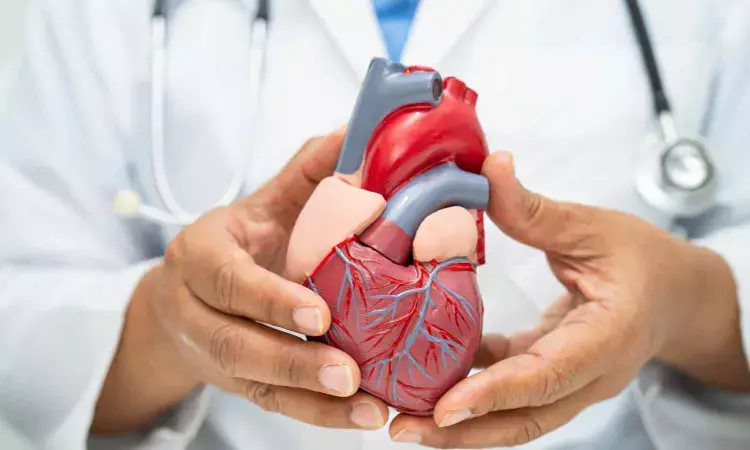- Home
- Medical news & Guidelines
- Anesthesiology
- Cardiology and CTVS
- Critical Care
- Dentistry
- Dermatology
- Diabetes and Endocrinology
- ENT
- Gastroenterology
- Medicine
- Nephrology
- Neurology
- Obstretics-Gynaecology
- Oncology
- Ophthalmology
- Orthopaedics
- Pediatrics-Neonatology
- Psychiatry
- Pulmonology
- Radiology
- Surgery
- Urology
- Laboratory Medicine
- Diet
- Nursing
- Paramedical
- Physiotherapy
- Health news
- Fact Check
- Bone Health Fact Check
- Brain Health Fact Check
- Cancer Related Fact Check
- Child Care Fact Check
- Dental and oral health fact check
- Diabetes and metabolic health fact check
- Diet and Nutrition Fact Check
- Eye and ENT Care Fact Check
- Fitness fact check
- Gut health fact check
- Heart health fact check
- Kidney health fact check
- Medical education fact check
- Men's health fact check
- Respiratory fact check
- Skin and hair care fact check
- Vaccine and Immunization fact check
- Women's health fact check
- AYUSH
- State News
- Andaman and Nicobar Islands
- Andhra Pradesh
- Arunachal Pradesh
- Assam
- Bihar
- Chandigarh
- Chattisgarh
- Dadra and Nagar Haveli
- Daman and Diu
- Delhi
- Goa
- Gujarat
- Haryana
- Himachal Pradesh
- Jammu & Kashmir
- Jharkhand
- Karnataka
- Kerala
- Ladakh
- Lakshadweep
- Madhya Pradesh
- Maharashtra
- Manipur
- Meghalaya
- Mizoram
- Nagaland
- Odisha
- Puducherry
- Punjab
- Rajasthan
- Sikkim
- Tamil Nadu
- Telangana
- Tripura
- Uttar Pradesh
- Uttrakhand
- West Bengal
- Medical Education
- Industry
Trametinib new treatment option for with severe hypertrophic cardiomyopathy in children, reveals research

Trametinib, a mitogen-activated protein kinase (MEK) inhibitor, reduces mortality and morbidity in children with severe hypertrophic cardiomyopathy (HCM) caused by pathogenic variants in the RAS/MAPK pathway, according to a study published today in JACC: Basic to Translational Science. The study provides strong evidence for personalized treatment targeting the underlying genetic causes of RASopathies, a group of rare disorders that often lead to life-threatening cardiac complications.
“Our findings represent a breakthrough in the treatment of HCM in children, particularly those suffering from severe forms of the disease due to genetic variants in the RAS/MAPK pathway,” said Gregor Andelfinger, MD, PhD, co-author of the study and a cardiologist at CHU Saint-Justine in Montreal. “The positive results we observed with trametinib are a promising step forward in addressing an urgent medical need for children whose condition has not responded to standard therapies.”
HCM, a condition where the heart muscle thickens abnormally, is particularly dangerous in children and can lead to heart failure or premature death. About 20% of patients with RASopathies have HCM; RASopathy-associated HCM is often caused by genetic mutations in the RAS/MAPK signaling pathway, which regulates cell growth and development. It is often a more severe form of HCM and has a higher mortality rate. Until now, treatment options for severe cases of RASopathy-associated HCM (RAS-HCM) in pediatric patients have been limited.
The study, which involved 61 children with severe RAS-HCM, compared 30 children receiving trametinib to 31 children receiving standard care. The results showed a significant reduction in the outcome of death, cardiac transplantation, or the need for cardiac surgery in the trametinib group. No life-threatening adverse events were observed, although dermatologic and mucous membrane side effects were common but manageable.
“This study provides crucial evidence that targeted therapies like trametinib could dramatically improve the outlook for children suffering from severe HCM,” Andelfinger said. “It underscores the importance of developing genotype-specific therapies for RASopathies and other rare diseases.”
“The paper by Andelfinger and colleagues provides exciting data with respect to treating ‘Rasopathies’ in children with HCM,” said Douglas Mann, MD, FACC, Editor-in-Chief of JACC: Basic to Translational Science. “Rasopathies are a group of rare genetic disorders that are caused by mutations in genes that regulate the Ras/mitogen-activated protein kinase (MAPK) signaling pathway.”
“Given the rarity of this condition and the lack of existing therapies for these children, we felt it was important to publish this paper, with the hope that it will advance the field by providing a foundation for future randomized clinical trials to definitively evaluate the safety and efficacy of Trametinib in children with HCM,” Mann said.
Study limitations include potential biases due to its design and incomplete data collection for the control group. Additionally, the trametinib group included patients with prior heart surgeries, which could affect the results. The shorter follow-up for the trametinib group may also underestimate long-term side effects. Lastly, the study does not determine the optimal dosing of trametinib for RAS-HCM.
Reference:
Cordula M. Wolf, Martin Zenker, Olga Boleti, Stefan Rupp, Andreas Hahn, Anja Hanser, Michael Hofbeck, Jos M.T. Draaisma, Floris E.A. Udink ten Cate, Alessandro Mussa, Giovanni B. Ferrero, Laurence Vaujois, Marie-Josée Raboisson, Marie-Ange Delrue, Christopher Marquis, Yves Théoret, Soujanya Bogarapu, Adrian Dancea, Mette Moller Handrup, Mariska Kemna, Tiina Ojala, Niti Dham, Frank Dicke, Tim Friede, Juan Pablo Kaski, Bruce D. Gelb, Gregor Andelfinger, Impact of MEK Inhibition on Childhood RASopathy-Associated Hypertrophic Cardiomyopathy, JACC: Basic to Translational Science, 2024, https://doi.org/10.1016/j.jacbts.2024.10.002.
Dr Kamal Kant Kohli-MBBS, DTCD- a chest specialist with more than 30 years of practice and a flair for writing clinical articles, Dr Kamal Kant Kohli joined Medical Dialogues as a Chief Editor of Medical News. Besides writing articles, as an editor, he proofreads and verifies all the medical content published on Medical Dialogues including those coming from journals, studies,medical conferences,guidelines etc. Email: drkohli@medicaldialogues.in. Contact no. 011-43720751


